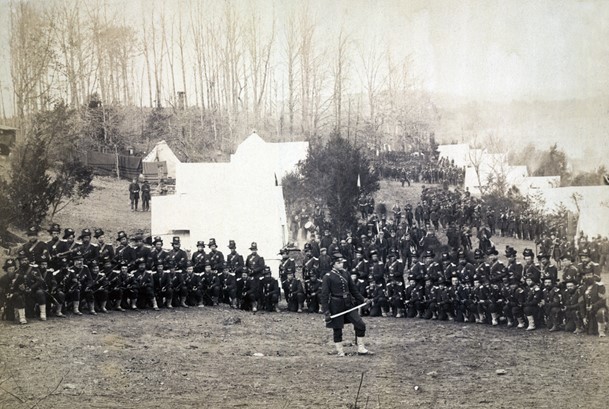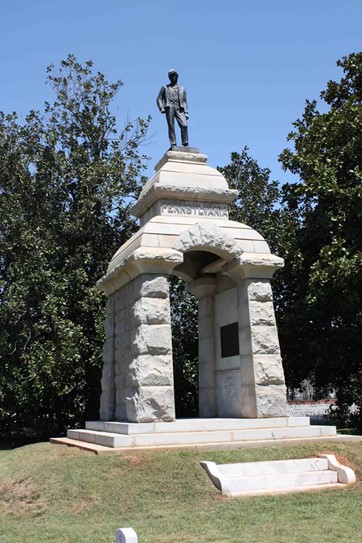The Civil War Letters of James and Ann Colwell
When the Civil War erupted in 1861, James Colwell and his wife Ann were living in Carlisle, Pa.


Top: Private Levi Bowen (16E-08-03)
Middle: 7th Pa. Reserves, Company H. Levi Bowen’s Unit
Bottom: Pennsylvania Monument, Andersonville Prison Camp Cemetery
The experiences of Levi Bowen during the Civil War are examples of perseverance in the face of severe hardship. It is surprising he survived the war after the trauma he endured. Levi’s diary describes his service from April to December 1864. Before he started his diary, he had already served more than two years in the Union army.
When the Civil War began, Levi Bowen was living in Lower Allen Township, Cumberland County and learning the blacksmith trade. On December 17, 1861, he enlisted as a private in the 7th Pa. Reserves, Company H, which was called the “Cumberland Guards”. His enlistment records describe him as 23 years old, 5’5” tall, dark complexion, brown eyes, black hair, occupation: blacksmith.
In June 1862, the 7th Pa. Reserves participated in a series of engagements known as the Seven Days Battles near Richmond, Va. At the battle of Mechanicsville on June 26, the unit was savagely attacked several times but repulsed each attack. The next day at the Battle of Gaines Mill, the Union position was attacked again and driven from the field. The 7th Pa. Reserves suffered 50% losses while covering the retreat of the army. Levi survived the fight and retreated with the remnants of his regiment.
At the Battle of Glendale on June 30, the Pa. Reserves were located at the center of the line and took the brunt of the Confederate attacks. General McCall, Levi’s division commander, described the battle as “one of the fiercest bayonet fights that perhaps ever occurred on this continent.” During that fight, Levi received gunshot wounds in the arm and side and left for dead on the field. He was reported as killed in action. He miraculously survived and was found the next day by Confederate soldiers, taken prisoner, and sent to a hospital in Richmond. Levi was paroled July 26, 1862, and sent to a convalescent camp in Annapolis, MD. He reported for duty in November 1862, although he still carried buckshot in his side.
Less than a month later, the 7th Pa. Reserves was in the middle of fierce fighting at the Battle of Fredericksburg, VA. The regiment broke through the Confederate line but was counterattacked and forced to withdraw. In that action, Levi’s unit captured the 19th GA flag; the only Confederate flag captured by the Union during the battle. After Fredericksburg, the 7th Pa. Reserves was sent back to Harrisburg, PA to recover its losses. It spent most of 1863 at Camp Curtin near Harrisburg.
Levi Bowen reenlisted in the 7th Pa. Reserves on February 13, 1864. In April 1864 he began to record in his diary. His entries each day were generally short, only one or two sentences, and written in a plain, matter-of-fact style. For example, on April 19, 1864, he writes his regiment “Left Alexandria, arrived at Camron Run about 2 o’clock. Was detailed for camp guard.” For the next nine days the unit remained in camp and Levi recorded the monotonous tasks of camp life such as inspections and guard duty. On April 29, the 7th Pa Reserves marched to Culpeper, VA to be part of General Grant’s campaign to Richmond. While at Culpeper a severe storm struck the region and a frustrated Levi notes, “The wind blowed my tent down. Got very wet before I could get it up again.”
The 7th Pa Reserves left Culpeper on May 4, 1864 and marched south into an area known as the Wilderness. The region was heavily wooded, with tangled undergrowth and few roads. The next day Levi Bowen and the 7th Pa. Reserves collided with the Confederate army in the Battle of the Wilderness. In his diary Levi refers to the fight as the battle of Locust Grove after a nearby village. The fighting through the dense woods was confusing and at close quarters. One participant likened it to “bushwacking on a grand scale.” During the battle the 7th Pa. Reserves was surrounded by the enemy and practically the entire regiment (272 men) was captured. Levi’s description of these events is extremely short and to the point; he was probably shaken by the experience. He simply recorded on May 5, “Fought the battle at Locust Grove. Was taken prisoner and marched to Orange Court House.” The prisoners did not realize they were going to the infamous Andersonville prison camp in Georgia.
On their journey south they passed though Lynchburg, Va. where Levi records that “a great many ladies came to see the yankey”. After an 18-day journey, Levi arrived at Andersonville on May 23, 1864. He refers to the prison camp by its official name, Camp Sumter. “Went into Camp Sumpter at 5 o’clock in the evening.”
Andersonville was notorious for overcrowding, poor sanitation, malnutrition, and disease. One stream ran through the camp which served as the chief source of water and garbage dump. Prisoners had to provide their own shelter which generally consisted of holes in the ground covered by blankets. The day after Levi arrived, he records in his diary, “Sewed our blankets together and put up tent. Drawed a ration of cornbread and bacon.”
Levi Bowen’s descriptions of Andersonville prison life are remarkable in that they contain very little complaints about the abysmal living conditions. There are many entries describing the inhospitable weather, which is either “sultry hot” or thunderstorms. On the 4th of July he was issued boiled beef and corncakes which he notes is “rather poor grub for the fourth.” He observed new prisoners arriving every few days, sometimes by the hundreds. When Levi arrived in May the population of the camp was approximately 12,000. By the time he left in September it is over 32,000. There were also prison escape attempts, but it does not appear Levi was involved in them. On June 14, 1864 he mentions a failed attempt, “The Rebs are just filling up a tunnel that the Yankees have been digging to make their escape.”
In addition to the horrible conditions of Andersonville, the prisoners also had to contend with harassment and violence from fellow prisoners. A prison gang known as the “Raiders” robbed and sometimes murdered sick and helpless prisoners. Occasionally the prisoners fought back, and Levi describes an encounter on May 27th, “Got up at 4 o’clock in the morning and saw the boys catch a raider. They shaved his head and gagged him.” By the end of June 1864, the gangs were so bad the prison guards took action. On July 1st Levi indicates, “They police area catching the raiders and taking them out of camp.”
Captain Wirz, the prison camp commander, allowed the prisoners to try the gang members. On July 5th Levi writes, “The convicted were tried for murder and various other offences of which they were found guilty.” On July 11, six gang members were executed and Levi witnessed the historic event. He notes in his diary, “Great excitement in camp. Six men executed on the gallows at 4 o’clock. Verdict guilty of murder and robbery. One broke the ropes and one run but was caught.” Levi’s description of the event is accurate. While the guilty prisoners were being marched to the gallows, one tried to run away but was caught and returned to the line. During the hanging, one of the ropes broke and a prisoner dropped to the ground. He was forced back up on the gallows and hanged again.
One of the last entries in Levi’s diary is on July 14, 1864 where he lists the names of friends that died at the prison camp. Of the 272 men of the 7th Pa Reserves captured at the Wilderness battle, 67 died at Andersonville. There are only a few sporadic entries after this. Levi’s own health was probably deteriorating at this time, which may account for his lack of writing.
After Atlanta fell to the Union army on September 2, 1864, there was fear that Andersonville would be next. As a result, most of the prisoners were relocated to another prison camp at Florence, SC. Levi Bowen left Andersonville on September 12 and arrived at Florence on September 15. To keep order during the move, the prisoners were told they were being paroled.
Levi Bowen was finally paroled on February 27, 1865, and sent to hospitals in Annapolis and Baltimore. He returned to Camp Curtin near Harrisburg on April 2, but his health prevented him from continuing home. The Assistant Surgeon recorded that Levi Bowen was admitted to the camp’s hospital “too broken down and unable to travel further.” Levi was honorably discharged from the army on June 28, 1865.
After the war Levi returned to the blacksmith trade and lived in Lower Allen Township, Cumberland County. He married Martha Whisler in 1867 and they had 10 children. The family moved to Fairview Township, York County where Levi went into farming. His disabilities from war wounds and prison camp troubled him throughout his life. His pension record lists his ailments as gunshot wounds, rheumatism, impaired vision, heart trouble, vertigo, and piles.
Levi apparently kept in contact with his army comrades. At the end of his diary under “Memoranda” he listed surviving members of his old unit, their relatives, and descendants. In 1905 Levi travelled back to the site of Andersonville prison camp to attend the dedication of the Pa. Monument at the camp’s cemetery.
Levi Bowen died on September 2, 1924 at the age of 85. The Civil War monument in Carlisle, Pa. erroneously lists his name with those that died during the war. This appears to be based on the inaccurate report that he was killed at the battle of Glendale. Levi Bowen lived a remarkably full life after surviving savage combat, a near fatal wound, and the horrors of Andersonville. He is buried at Mount Olive Cemetery, Fairview Township, York County.
When the Civil War erupted in 1861, James Colwell and his wife Ann were living in Carlisle, Pa.
Levi A. Bowen Collection, Diary April – December 1864, Military and family records, Cumberland County Historical Society, 21 North Pitt Street, Carlisle, Pa.
Sypher, Josiah, History of the Pennsylvania Reserves: A Complete Record of the Organization, 1865.
Report of George A. McCall, Aug. 12, 1862, War of the Rebellion, A Compilation of the Official Records of the Union and Confederate Armies, 1884.
Marvel, William, Three Roads to Andersonville, Blue and Gray, December 1992.
Official Records of the War of the Rebellion, Series II, Volume VII, 1899.